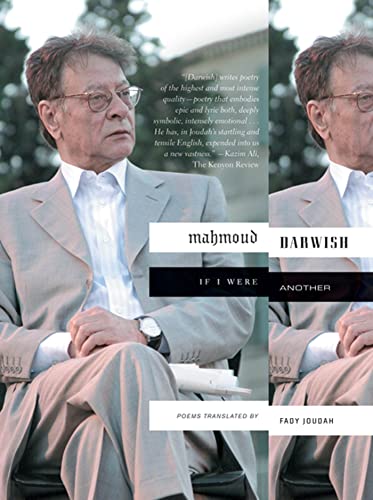All books / Book
If I Were Another

| Full title: | If I Were Another |
|---|---|
| ISBN: | 9780374532475 |
| ISBN 10: | 0374532478 |
| Authors: | Darwish, Mahmoud |
| Publisher: | FSG Adult |
| Edition: | Reprint |
| Num. pages: | 234 |
| Binding: | Paperback |
| Language: | en |
| Published on: | 2011 |
Read the reviews and/or buy it on Amazon.com
Synopsis
Winner of the PEN USA Literary Award for Translation
Mahmoud Darwish was that rare literary phenomenon: a poet both acclaimed by critics as one of the most important poets in the Arab world and beloved by his readers. His language—lyrical and tender—helped to transform modern Arabic poetry into a living metaphor for the universal experiences of exile, loss, and identity. The poems in this collection, constructed from the cadence and imagery of the Palestinian struggle, shift
between the most intimate individual experience and the burdens of history and collective memory. Brilliantly translated by Fady Joudah, If I Were Another—which collects the greatest epic works of Darwish’s mature years—is a powerful yet elegant work by a master poet and demonstrates why Darwish was one of the most celebrated poets of his time and was hailed as the voice and conscience of an entire people.
Publishers Weekly
This second volume by the late, great Palestinian poet Darwish (1941–2008) to be translated by Palestinian-American doctor/poet Joudah comprises four nonconsecutive books of longer poems spanning 1990 to 2005. These works follow Darwish's poetic development from a historically focused middle period to the devastatingly personal lyric-epic of his late style. Formally varied—Rubaiyats alternate with sprawling free-form poems, in which prose paragraphs meet both long and short verse lines—Darwish's Sufi-inspired poetry probes, admires, describes, longs for and questions. His subjects are often broad: the inheritance and disinheritance of lands, languages and histories. Sometimes, though, he turns to concrete need, confessing, for example, in “Mural,” his book-length poem about a brush with death: “I want to walk to the bathroom/ on my own.” But Darwish's poems are at their most singular and powerful when he collapses the boundaries between great and small concerns, as when he articulates, “Wars teach us to love detail: the shape of our door keys,/ how to comb our wheat with eyelashes and walk lightly on our land.” The stakes of this work—for Darwish and for his readers—are clear: “O my language,/ help me to adapt and embrace the universe.” (Nov.)